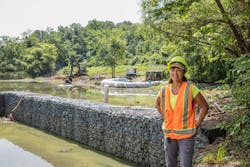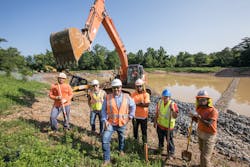Stronger Together, Part 2
This is the second part of our two-part coverage of the Clean Water Partnership between Prince George's County, MD, and Corvias. Read Part 1 in the April 2020 issue.
Established in 2015, the Clean Water Partnership (CWP) is a 30-year community-based partnership between Prince George’s County, MD, and Corvias to achieve regulatory compliance to address the county’s aging stormwater and infrastructure needs. A critical added benefit has been the Partnership’s model that invests in training, mentoring, and maximization of participation of local small businesses and infrastructure professionals.
Jami Kirila, president of Bowie, MD-based Kirila Earthworks Inc, and Donna An, principal of Beltsville, MD-based Actaeon LLC are both county-certified small, minority- and women-owned businesses who have graduated through the CWP’s Mentor Protégé Program (MPP) and continue to bring stormwater improvements to the Maryland county.
Jami Kirila is the president of Kirila Earthworks, a woman-owned site and utility contractor founded and headquartered in Prince George’s County, MD. She previously served as the finance director for the City of Hermitage, PA, and owned and operated a small paving company with her husband Dave Kirila for a number of years. There, she handled all accounting, payroll, and back-office functions on nights and weekends. After 19 years of service for the City of Hermitage, Kirila resigned from her position in 2014 to move to Virginia to support her husband, who had received a promotion to pre-construction development manager for a large excavating company. After a reconfiguration of her husband’s position, Kirila and her family looked to leverage their skills and connections in a new family business.
In June 2015, Jami and Dave established Kirila Earthworks, utilizing her expertise in finance and her husband’s knowledge of construction operations, excavation, and utility installation. They were also introduced to the Clean Water Partnership (CWP), aware that CWP was a great platform to support and mentor new companies.
Donna An is a Certified Project Management Professional and ecosystem restoration specialist with over 12 years of project management experience and six years of construction experience delivering successful stream and wetland restoration projects, particularly Step Pool Stormwater Conveyance (SPSC).
An has a successful track record of completing construction projects within budget and on schedule, advancing project goals by monitoring and controlling activities and strategically tackling new challenges. She often serves dual roles as project manager and construction manager, including a $3.3 million stream restoration project for DC Water.
Prior to her restoration career, she served a seven-year tenure at the US Environmental Protection Agency (EPA) as manager of $15 million Wetland Program Development Grants Program and assisted in the publication of “Ambient Water Quality Standards for Dissolved Oxygen, Water Clarity and Chlorophyll a for the Chesapeake Bay and its Tidal Tributaries,” which earned her a US EPA Gold Medal Award for Excellence.
Stormwater: What drew you to participate in the Mentor-Protégé Program?
Jami Kirila: The overall concept of the Clean Water Partnership drew us to participate in the Mentor-Protégé Program. The idea that a construction-based program could focus on green infrastructure, while helping to guide and grow local, small and minority companies, was an opportunity we could not pass up.
And as a startup company in Prince George’s County, MD, the Clean Water Partnership has afforded us the opportunity to bid, procure, and execute multiple projects within close proximity to our office while hiring and employing local county residents.
Donna An: I am a strong believer in the mentor-protégé relationship as a way of learning, exchanging ideas, and understanding things that I have yet to experience directly. I immediately gravitated to the program when I found out about it. As an entrepreneur, I was hungry for hands-on knowledge, understanding, and experience, and also felt I had a lot to offer those just getting into the field. Tradition and innovation are the two sides of the coin that ensure not only that we survive, but that we thrive. We need both, and the Mentor-Protégé Program provides that by offering a version of the traditional apprentice-journeyman-master type structure for a growing field that offers exciting and meaningful opportunities, yet sorely lacks specialized training opportunities.
SW: What kind of support and training did you receive?
JK: As a firm participating during the first cohort of the Mentor-Protégé Program, we had the unique experience of participating through the developmental process. We received direct support from our mentors, Michael Burke and Nicole Copeland, and group training sessions on a regular basis focusing on the business side of business throughout the 18-month program timeframe. The biggest issue small businesses face is not having the overall insight and experience to “run” a business. The mentors were instrumental in that aspect.
DA: I received training on basic business operations such as bookkeeping, human resources, and project management such as estimating, bonding, construction scheduling, and reading engineering plans.
During a CWP construction project, I received moral support from the MPP director and manager who visited my sites, kept abreast of my construction progress and provided a media opportunity for my company. I have not had insurmountable challenges but if I do, I know I can turn to my MPP network for consultation and possibly mediation. And the general contractors provided one of the best professional project management support systems I’ve experienced in my eight years in construction.
The program asked for feedback from the protégé firms about our needs and tailored the trainings to our cohort’s needs and interests. My cohort also had a diverse group that included a concrete contractor, landscaping firms, a stream restoration contractor, plumber, homebuilder—ranging from tiny to moderate in company size. It didn’t merely create a great networking opportunity. We developed a bond over the course of the program, learned from each other, shared our woes, and celebrated our successes.
SW: In your opinion, what is the biggest strength of the program?
JK: We believe the biggest strength of the program is most definitely the support provided for local, small and minority businesses. During the duration of the program, we were also fortunate to develop a genuine comradery with the other protégé firms and are grateful for that opportunity.
SW: What would you like to see the program improve?
JK: We are hopeful that the Clean Water Partnership’s Mentor-Protégé Program will serve as a pilot for similar programs throughout the United States. Much time and effort has been spent to develop a program that provides needed assistance for local, small and minority business, supporting controlled growth and building capacity while focusing on projects which help to improve the surrounding community and property values through green construction.
DA: A couple of years ago, I would have said that outreach and advertising to prospective protégés was an area for improvement. But the program has filled spots for the past three years so perhaps the level of outreach reflected a delicate balance that the program needed to strike, as it started out, between casting a wide net to generate interest, identifying qualified candidates, recruiting a cohort with diverse experiences and dialing in the programming to produce graduates that can begin networking and performing the specialized construction work to successfully manage stormwater.
SW: Would you recommend the Program to other firms like yours?
JK: Absolutely! The opportunity to make a positive impact on the local community through environmentally sound stormwater maintenance and construction projects while receiving guidance and education from a skilled and experienced team is a rare opportunity and one that should definitely be taken advantage of.
We take great pride in our work and being able to see a project go from an outdated stormwater collection facility to a fully functioning and compliant system through the implementation of best management practices. The end project results in improved aesthetics of local residential and commercial developments and increased property values, all while being certified as municipal separate storm sewer systems stormwater management compliant.
DA: Absolutely. If a start-up or young company is seriously interested in getting into stormwater management construction, the program offers a solid introduction to the basics of business operation and stormwater construction. And the networking opportunity is phenomenal. It’s clear that the program has a genuine interest in your company’s success and provides guidance and feedback to fine-tune your business operations as well as help increase exposure to opportunities. I am deeply grateful to my mentors and the program for the encouragement and opportunities.



